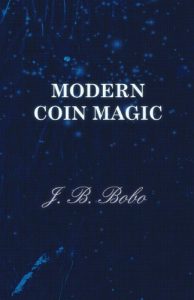Little has been written on the subject, and much of that is scattered throughout dozens of books and magazines. Because of this, it has been difficult for the student to obtain all the information necessary to his becoming a proficient coin worker. This deficiency in magical literature has long been recognized, but little has been done about it. In recent years there have appeared a few books devoted partly to coin magic but none has filled the necessary need adequately.
Of course, not all the material in this book is new. It is not intended to be. The purpose, as mentioned in the beginning, is to cover the subject of sleight of hand coin magic in all its practical aspects. To do this it has been necessary to include many of the standard principles of the past. However, all out-of-date or otherwise impractical sleights have been eliminated. Only the best and most useful have been retained. To these basic principles have been added many new and revolutionary ideas, all of which should give the student a conception of coin magic hitherto unknown.
The best coin tricks require skill, but there are few magicians today who are willing to spend the necessary time and practice obtaining that skill. Jean Hugard summarized his opinion on the subject well when he said, “There is an unfortunate trend among those who dabble in magic, and even those who rate themselves as magicians, to avoid anything that requires a little study and practice and to rely on tricks that work themselves, tricks ‘that can be done five minutes after you receive them,’ as we see advertised so often.”
Of all the branches of magic none is so practical as the manipulation of coins. Coins are always available. If a magician can do a few coin tricks he is always prepared to entertain.
Learning the moves of tricks and sleights is not enough. They should be practiced over and over, dozens of times, so that you can do them automatically, without thinking. Only then will you be able to give your attention to presentation, patter, misdirection, and all those things that have so much to do with making a magician a success. The secret workings of a trick are only a means to an end.
A well-presented trick is like a beautiful piece of music—audiences never tire of it. I have seen Blackstone perform the Dancing Handkerchief dozens of times but I always enjoy seeing it again. And Le Paul with his beautiful card magic. Who could tire of watching him! And so it is with all good entertainers—they are masters of their art and people always welcome the opportunity of seeing them again and again. And if it be your desire to master this art, take heart; for ‘No man is his crafts’ master the first day.’
Of course, not all the material in this book is new. It is not intended to be. The purpose, as mentioned in the beginning, is to cover the subject of sleight of hand coin magic in all its practical aspects. To do this it has been necessary to include many of the standard principles of the past. However, all out-of-date or otherwise impractical sleights have been eliminated. Only the best and most useful have been retained. To these basic principles have been added many new and revolutionary ideas, all of which should give the student a conception of coin magic hitherto unknown.
The best coin tricks require skill, but there are few magicians today who are willing to spend the necessary time and practice obtaining that skill. Jean Hugard summarized his opinion on the subject well when he said, “There is an unfortunate trend among those who dabble in magic, and even those who rate themselves as magicians, to avoid anything that requires a little study and practice and to rely on tricks that work themselves, tricks ‘that can be done five minutes after you receive them,’ as we see advertised so often.”
Of all the branches of magic none is so practical as the manipulation of coins. Coins are always available. If a magician can do a few coin tricks he is always prepared to entertain.
Learning the moves of tricks and sleights is not enough. They should be practiced over and over, dozens of times, so that you can do them automatically, without thinking. Only then will you be able to give your attention to presentation, patter, misdirection, and all those things that have so much to do with making a magician a success. The secret workings of a trick are only a means to an end.
A well-presented trick is like a beautiful piece of music—audiences never tire of it. I have seen Blackstone perform the Dancing Handkerchief dozens of times but I always enjoy seeing it again. And Le Paul with his beautiful card magic. Who could tire of watching him! And so it is with all good entertainers—they are masters of their art and people always welcome the opportunity of seeing them again and again. And if it be your desire to master this art, take heart; for ‘No man is his crafts’ master the first day.’






